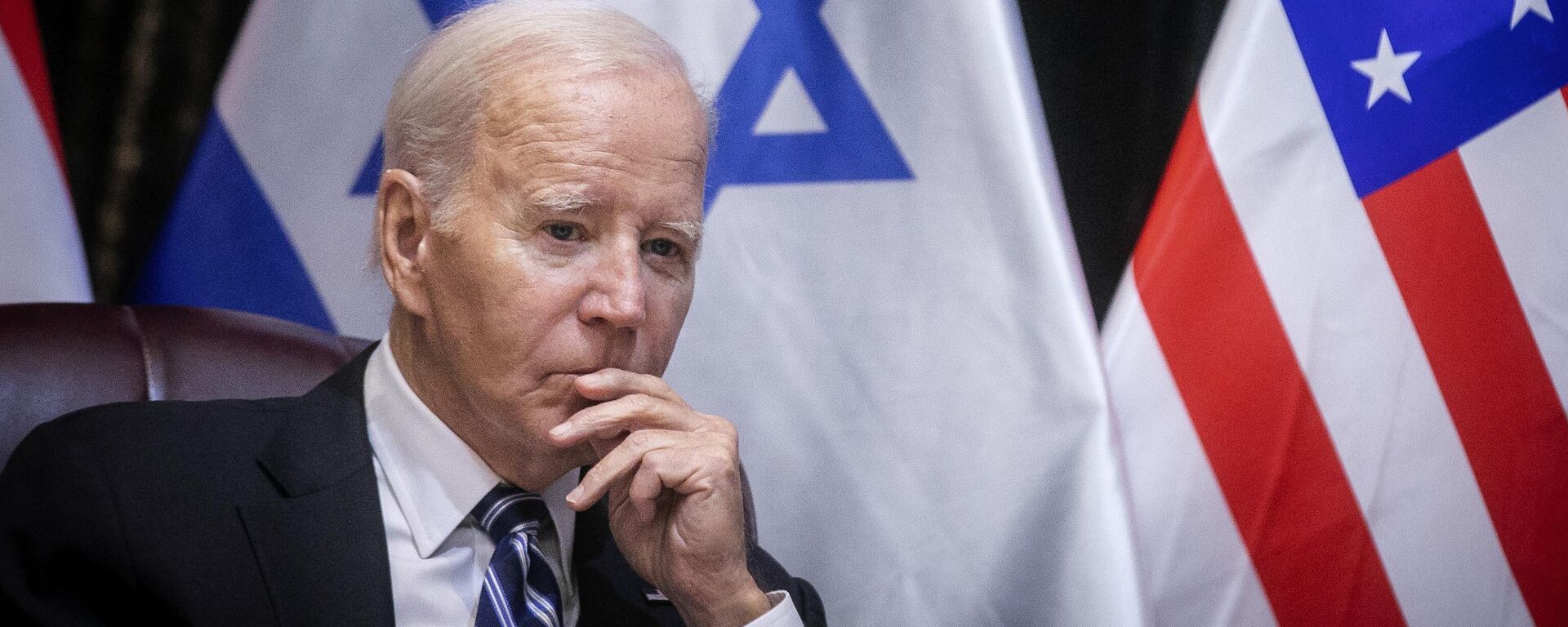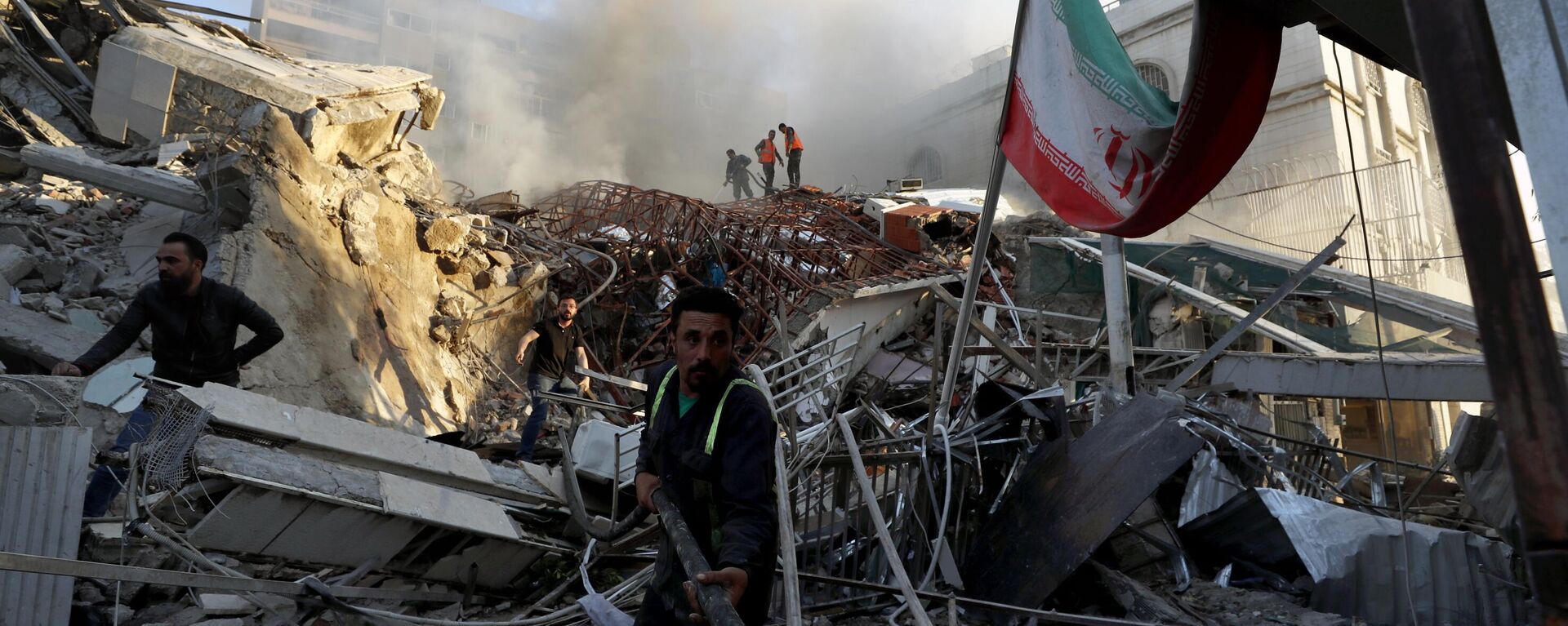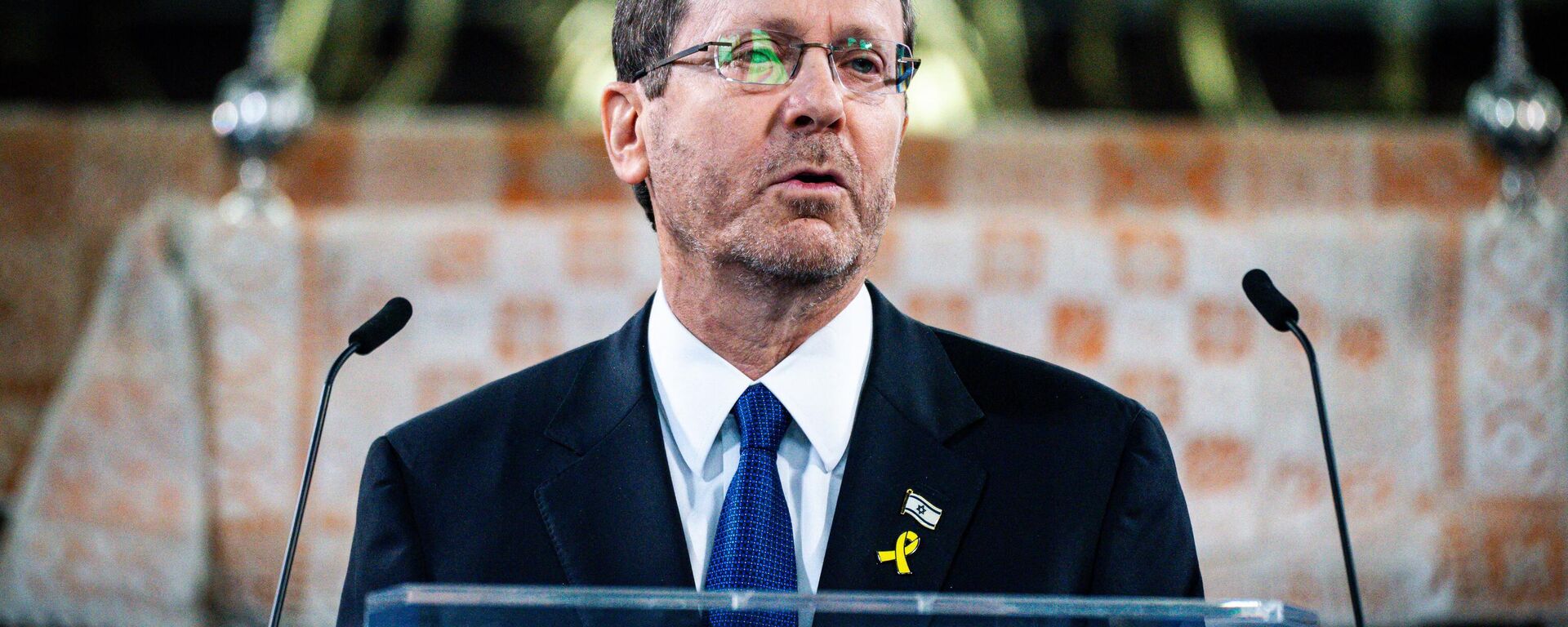https://sputnikglobe.com/20240415/us-hard-pressed-to-react-as-iran-gets-complete-map-of-israeli-defense-capabilities-1117944044.html
US Hard-Pressed to React as Iran Gets ‘Complete Map of Israeli Defense Capabilities’
US Hard-Pressed to React as Iran Gets ‘Complete Map of Israeli Defense Capabilities’
Sputnik International
Iran launched a large-scale missile and drone attack into Israel overnight Saturday targeting military and intelligence sites in response to an Israeli attack on its Damascus Embassy compound April 1. Prime Minister Netanyahu has threatened to “hurt” Iran, while President Biden has reportedly said the US won’t assist in an Israeli counterattack.
2024-04-15T15:24+0000
2024-04-15T15:24+0000
2024-04-15T15:24+0000
analysis
benjamin netanyahu
joe biden
benny gantz
middle east
israel
tel aviv
washington
israel defense forces (idf)
iran-israel row
https://cdn1.img.sputnikglobe.com/img/07e8/04/0f/1117944395_0:160:3072:1888_1920x0_80_0_0_d718022fecc89474bfbd9faa97c24434.jpg
Israel’s war cabinet has reportedly failed to reach a consensus on when and how to respond to Iran’s weekend missile and drone barrage, with Israeli media reporting that US pressure has complicated planning.“There will be a response,” an anonymous Israeli official was quoted as saying by Israel Hayom. However, a final decision has not been made, and the cabinet is divided over what the form the response could take and its timing, according to a Times of Israel report.US media have reported that President Biden told the Israeli prime minister that Washington wouldn’t support any offensive action against Iran, calling the coordinated defense of Israeli airspace together with the UK, France and Jordan a “win” and promising “ironclad” US support for Tel Aviv going forward.US Has Only Itself to Blame“The US is always in complicated situations, and most of the time they can only blame themselves,” Dr. Marco Carnelos, a veteran Italian diplomat and former Middle East advisor to Prime Ministers Prodi and Belusconi, told Sputnik, commenting on the strategic bind Washington has found itself in the wake of Iran’s counterstrike.“It’s becoming a more and more difficult circle to square, especially in a difficult and highly polarized electoral year. The US needs to buy time, until November, [but] are we so sure that all the other players are keen to sell some time to Washington?”As far as Israel’s response is concerned, Dr. Carnelos says that without US help, it could come in the form of activating its regional proxies, who are admittedly “not quite [as] effective” as those their adversary. Such a step could also “backfire,” the observer says, noting that even an escalation caused by proxies may be something the US is looking to avoid.Ultimately, “the ball is now in the Israeli court” as far as the response is concerned, Carnelos believes.That means next time, if Israel responds with force despite warnings not to do so, “another [Iranian] attack could not be largely preannounced as it has been this time, and above all…could be carried out with far more lethal and accurate modalities,” Carnelos warned.
https://sputnikglobe.com/20240415/americans-approval-of-bidens-handling-of-gaza-conflict-drops-to-new-low—poll-1117940898.html
https://sputnikglobe.com/20240415/at-least-9-iranian-missiles-hit-2-targeted-israeli-airbases—reports-1117937383.html
https://sputnikglobe.com/20240414/israeli-president-calls-irans-missile-and-drone-attack-declaration-of-war-1117932032.html
israel
tel aviv
washington
2024
News
en_EN
https://cdn1.img.sputnikglobe.com/img/07e8/04/0f/1117944395_171:0:2902:2048_1920x0_80_0_0_9c027c775dbb75089d664a9331dd6be5.jpg
how will israel respond to iran’s attack, will us help israel, will us attack iran
how will israel respond to iran’s attack, will us help israel, will us attack iran
Iran launched a large-scale missile and drone attack into Israel overnight Saturday targeting military and intelligence sites in response to an Israeli attack on its Damascus Embassy compound April 1. Prime Minister Netanyahu has threatened to “hurt” Iran, while President Biden has reportedly said the US won’t assist in an Israeli counterattack.
Israel’s war cabinet has reportedly failed to reach a consensus on when and how to respond to Iran’s weekend missile and drone barrage, with Israeli media reporting that US pressure has complicated planning.
War Cabinet Minister Benny Gantz reportedly proposed launching an attack against Iran immediately, with Prime Minister Netanyahu, Defense Minister Yoav Gallant and the Herzi Halevi, the head of the IDF, said to have been opposed to the idea. The Prime Minister’s office denied this information, saying “the opposite was true” regarding Netanyahu.
US media have reported that President Biden told the Israeli prime minister that Washington wouldn’t support any offensive action against Iran, calling the coordinated defense of Israeli airspace together with the UK, France and Jordan a “win” and promising “ironclad” US support for Tel Aviv going forward.
White House National Security Council spokesman John Kirby told media on Sunday that the US doesn’t “seek a wider war in the region. We don’t seek a war with Iran. And I think I’ll leave it at that.”
US Has Only Itself to Blame
“The US is always in complicated situations, and most of the time they can only blame themselves,” Dr. Marco Carnelos, a veteran Italian diplomat and former Middle East advisor to Prime Ministers Prodi and Belusconi, told Sputnik, commenting on the strategic bind Washington has found itself in the wake of Iran’s counterstrike.
“The Biden administration will continue to attempt a quite difficult balancing act between the necessity to avoid an escalation and its ‘ironclad commitment’ to Israel’s security, which in some cases is a contradiction in terms,” the diplomat explained.
“It’s becoming a more and more difficult circle to square, especially in a difficult and highly polarized electoral year. The US needs to buy time, until November, [but] are we so sure that all the other players are keen to sell some time to Washington?”
As far as Israel’s response is concerned, Dr. Carnelos says that without US help, it could come in the form of activating its regional proxies, who are admittedly “not quite [as] effective” as those their adversary. Such a step could also “backfire,” the observer says, noting that even an escalation caused by proxies may be something the US is looking to avoid.
Locked in a four-and-a-half decade-long shadow war with Israel, Iran has long accused Tel Aviv of trying to divide Iran from within and topple the Islamic Republic using nationalist, terrorist and monarchist forces.
Ultimately, “the ball is now in the Israeli court” as far as the response is concerned, Carnelos believes.
“Iran has no further steps to contemplate, it can wait and see, although it could prepare its contingency plans,” he said, pointing out that the strikes over the weekend gave Tehran “a complete map of Israeli defense capabilities.”
That means next time, if Israel responds with force despite warnings not to do so, “another [Iranian] attack could not be largely preannounced as it has been this time, and above all…could be carried out with far more lethal and accurate modalities,” Carnelos warned.




